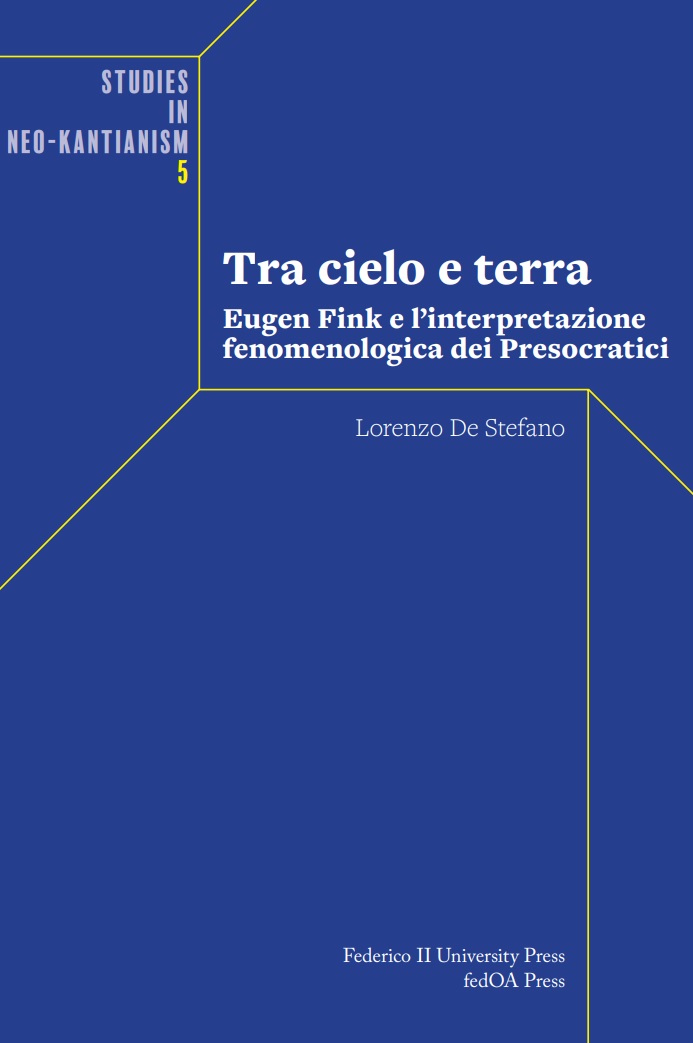Tra cielo e terra : Eugen Fink e l’interpretazione fenomenologica dei Presocratici

Author(s)
De Stefano, Lorenzo
Version
PublishedLanguage
ItalianAbstract
This study focuses on the interpretation of pre-Socratic philosophy in Eugen Fink and his mature cosmology, which characterizes the period following his assistantship with Edmund Husserl. It aims to trace the genesis of the cosmological perspective through a detailed analysis of lectures, volumes, seminars, and both published and unpublished documents from the author’s Nachlass, which deal with Greek and pre-Socratic philosophy. The articulation of the problem of the world is the result of a critical reworking of the phenomenology of Husserl and Heidegger, the philosophies of Kant, Hegel, and Nietzsche, and the fundamental turning point represented by the rethinking of the categories of Greek thought as hermeneutic watershed. The world and the “cosmological difference represent the form in which the question of being takes shape in this philosophy. This new cosmological ontology also constitutes a profound reconsideration of the problem of the transcendental and its categories, freed from the burden of subjectivity that still characterized the philosophies of Kant, Husserl, Heidegger, and Neo-Kantianism. In this context, Fink's phenomenological cosmology emerges as an original perspective and a particular critical interpretation of the history of metaphysics, indebted but not reducible to the perspectives of his masters. Questo studio ha per tema fondamentale l’interpretazione della filosofia presocratica in Eugen Fink e la sua cosmologia matura, che caratterizza il periodo successivo all’assistentato con Edmund Husserl. Esso intende ripercorrere la genesi della prospettiva cosmologica attraverso un’analisi dettagliata di lezioni, volumi, seminari e documenti editi ed inediti dal Nachlass dell’autore, aventi per oggetto la filosofia greca e presocratica. L’articolazione del problema del mondo è il risultato di una rielaborazione critica della fenomenologia di Husserl e Heidegger, delle filosofie di Kant, Hegel e Nietzsche e dello snodo fondamentale costituito dalla rimeditazione delle categorie del pensiero greco come effettivo spartiacque ermeneutico. Il mondo e la “differenza cosmologica sono la veste che la questione dell’essere e del nulla assume in tale filosofia. Questa nuova ontologia cosmologica costituisce anche una profonda rimeditazione della problematica del trascendentale e delle sue categorie, svincolata dall’ipoteca della soggettività che caratterizzava ancora le filosofie di Kant, Husserl e Heidegger, e il neokantismo. In questo contesto, la cosmologia fenomenologica di Fink si configura come una originale linea di pensiero e una particolare interpretazione critica della storia della metafisica, debitrice, ma non sovrapponibile, alle prospettive dei suoi maestri.
Keywords
Eugen FinkPublisher
FedOA - Federico II University PressPublisher website
http://www.fedoabooks.unina.it/index.php/fedoapressPublication date and place
Naples, 2024Series
Studies in Neo-Kantianism, 5Classification
Philosophy and Religion

